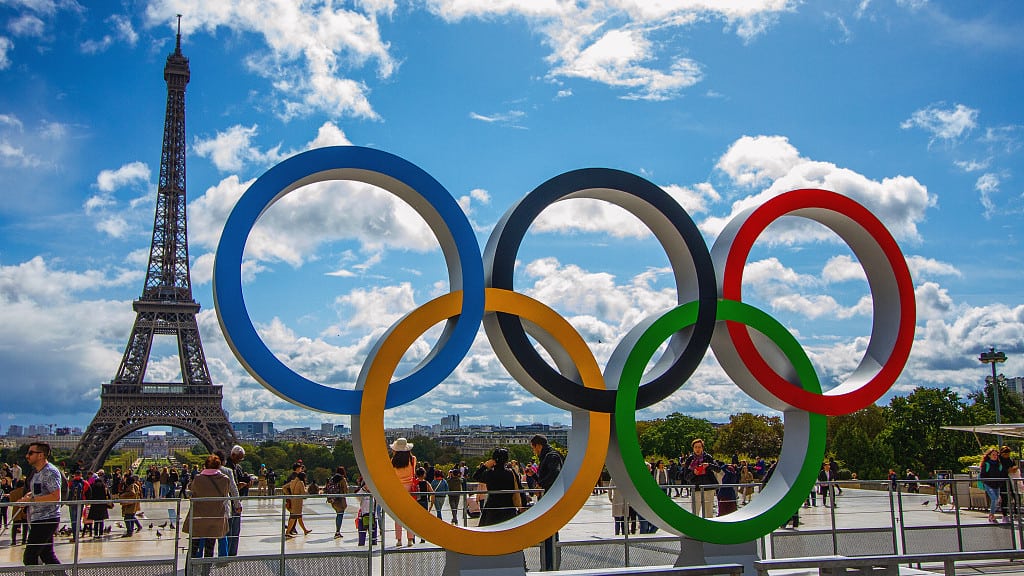Athletes dove into the Seine for the third time during the 2024 Paris Olympics as the swim portion of the mixed relay triathlon took place in the river on Monday, Aug. 5.
But two athletes who previously swam in the Seine fell ill amid ongoing concern about high levels of bacteria in the water. The pollution previously forced organizers to cancel training sessions and postpone the men’s swim by one day.
The concern is about E. coli and enterococci, germs that indicate fecal contamination, or the presence of raw sewage in the river.
When the levels reach a certain threshold, people swimming in the water can be at risk for gastrointestinal illness, eye infection, and infected cuts or wounds on their bodies, doctors warn.
In a joint statement, the Paris 2024 organizing committee and World Triathlon, the governing body for the sport, said they met late Sunday, Aug. 4, and decided the Seine water quality would be within “acceptable” levels for the mixed relay.
But that same day, Belgium withdrew from the mixed relay triathlon after announcing one of its athletes, Claire Michel, “is unfortunately ill,” the Belgian Olympic and Interfederal Committee said in a statement. Officials didn’t elaborate and didn’t say whether her illness was connected to bacteria in the Seine.
Michel competed in the women’s triathlon, including the swim in the river, on July 30.
Belgian officials pointedly expressed “hope that lessons will be learned for the next triathlon competitions at the Olympic Games,” the statement read.
“We are thinking here of the guarantee of training days, competition days and the competition format which must be clarified in advance and ensure that there is no uncertainty for the athletes, the entourage and the supporters.”
Meanwhile, Swiss athlete Adrien Briffod had to pull out of the mixed relay triathlon due to a gastrointestinal infection, the Swiss Olympic Association announced on Saturday, Aug. 3. He also swam in the Seine during the men’s triathlon on July 30.
“It is not possible to say whether Briffod’s infection is related to the water quality of the Seine,” the organization said in a statement.
His replacement also fell ill with a gastrointestinal infection, but that athlete didn’t previously swim in the river, Swiss officials said in a follow-up statement.
The Swiss team’s doctor said that based on his conversations with colleagues from other countries, there’s been no increase so far in gastrointestinal illnesses among athletes who swam in the Seine last week.
But athletes say they’ve been stressed by the constant uncertainty over whether the bacteria levels would allow the triathlon to go on.
“It seems like they were just hoping for the best and knew the athletes are going to do it because it’s the Olympics,” U.S. triathlete Morgan Pearson told Reuters.
“It just seemed like a bit of a crapshoot if we raced or not,” he added.
It’s uncomfortable to think about, but there’s always some fecal contamination in fresh water, so it’s all about the dose, says Dr. Amesh Adalja, a senior scholar at the Johns Hopkins Center for Health Security and a spokesperson for the Infectious Diseases Society of America.
“Anytime you jump into a body of water — not just the Seine, not just a city river — you have to recognize you’re not jumping into sterile water,” Adalja tells TODAY.com.
“Some of the coverage on this has been thinking that the river should have no bacteria, which is biologically a fantasy.”
What Olympic events are in the Seine River?
There are five swimming events scheduled to take place in the Seine at the Paris Olympics.
The first three are now in the books: Both the men’s and women’s swimming portion of the triathlon took place on Wednesday, July 31.
The mixed relay was completed on Monday, Aug. 5.
Marathon swimming in the Seine is set to take place later in the week: the women’s competition on Thursday, Aug. 8 and the men’s race on Friday, Aug. 9.
Is it safe to swim in the Seine?
It depends on the levels of bacteria in the water, which often change. A big factor is recent weather because heavy rain can send raw sewage overflowing into the Seine.
Paris Mayor Anne Hidalgo swam in the river on July 17 to demonstrate it’s clean enough for the Olympics after a nine-year cleanup effort.
But just a few days later, the levels of fecal bacteria spiked at Pont Alexandre III — the ornate bridge where athletes are set to begin their swims, according to the most recent data published by the city of Paris.
The Seine was once so dirty that swimming in it was banned for more than a century, NBC News reported.
One reason is city design.
Modern cities have separate pipes for sewage and storm water, but old cities like Paris have a single pipe for both, so when it rains a lot, that capacity is overwhelmed and the contents can spill into the Seine, says Dr. Nicole Iovine, an infectious disease specialist and chief epidemiologist at UF Health Shands Hospital in Gainesville, Florida.
It’s not just human waste that’s of concern.
“When rainwater that’s flowing over streets ends up in those pipes, you’re going to run into sewage that comes from animals as well — rodents, for example,” Iovine tells TODAY.com.
‘You’re bringing in additional types of bacteria that can also cause illness in humans.”
What are the potential health dangers?
Swimmers always swallow some water, especially when they’re making a big effort during competition. If the levels of fecal bacteria in the water are high, they may get gastrointestinal symptoms such as nausea, vomiting, diarrhea and abdominal pain, Adalja and Iovine say.
“We’re in a state of balance between good bacteria and bad bacteria,” Iovine notes.
“If you get in an influx of bad bacteria that disrupts that homeostasis, that’s where illness can occur.”
If the water gets into the eyes, it can cause eye infections like conjunctivitis, both experts say.
Elite athletes taking part in the Olympics are healthy and strong so they would likely experience minor illnesses, Adalja adds.
“But even if they don’t get hospitalized, if you’re an Olympian and you’re having nausea, vomiting and diarrhea, and it’s ruining your Olympics, that’s pretty devastating,” he says.
Wound infections might be more serious, he warns. There’s also the possibility of leptospirosis, a disease spread through bacteria in animal urine, which can cause fever and chills, and usually requires antibiotics to resolve, Iovine adds.
There’s really nothing the athletes can do to prevent illness other than wash any cuts or wounds with clean water after they finish their swim and be alert for the symptoms of gastrointestinal upset, both experts say.
Is Seine safe for the Olympics?
World Triathlon says it will meet with organizers on the morning of each scheduled event to analyze the latest water quality results and decide whether the swim can take place.
There’s the option for postponing the events in the Seine — contingency days are scheduled for both marathon and triathlon swimming, organizers say.
If water quality doesn’t improve, “the rules of World Triathlon allow, as a final resort, for the competition to be held is a duathlon format,” a spokesperson for the Paris 2024 organizing committee tells TODAY.com in a statement.
Triathletes can’t just move to a swimming pool because navigating the river with its currents is part of the sport, NBC’s Keir Simmons says.
But marathon swimming will still take place no matter what. The backup plan is for athletes to swim in the Vaires-sur-Marne Nautical Stadium, a competition venue that’s already being used for rowing events, the Paris 2024 spokesperson adds.
How did they clean the Seine for the Olympics?
France has spent $1.5 billion to upgrade the city’s antiquated sewage system, including renovating sewer infrastructure, upgrading wastewater treatment plants and building a giant underground water storage basin, NBC News reported.
That overflow tank, called the Austerlitz Basin, can hold the equivalent of the water in 20 Olympic swimming pools so that when it rains in Paris, the excess water can collect there instead of overwhelming the system and being discharged into the Seine, Paris 24 notes.
Peacock is streaming the Paris Olympics around the clock. Learn more about accounts here. TODAY earns a commission on purchases. Peacock is owned by our parent company NBCUniversal. -The Cut / Photo: Los Angeles Times



